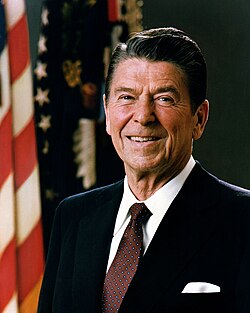Ronald Reagan Quote
Let me speak plainly: The United States of America is and must remain a nation of openness to people of all beliefs. Our very unity has been strengthened by this pluralism. That's how we began; this is how we must always be. The ideals of our country leave no room whatsoever for intolerance, anti-Semitism, or bigotry of any kind -- none. The unique thing about America is a wall in our Constitution separating church and state. It guarantees there will never be a state religion in this land, but at the same time it makes sure that every single American is free to choose and practice his or her religious beliefs or to choose no religion at all. Their rights shall not be questioned or violated by the state.-- Remarks at the International Convention of B'nai B'rith, 6 September 1984
Let me speak plainly: The United States of America is and must remain a nation of openness to people of all beliefs. Our very unity has been strengthened by this pluralism. That's how we began; this is how we must always be. The ideals of our country leave no room whatsoever for intolerance, anti-Semitism, or bigotry of any kind -- none. The unique thing about America is a wall in our Constitution separating church and state. It guarantees there will never be a state religion in this land, but at the same time it makes sure that every single American is free to choose and practice his or her religious beliefs or to choose no religion at all. Their rights shall not be questioned or violated by the state.-- Remarks at the International Convention of B'nai B'rith, 6 September 1984
Related Quotes
About Ronald Reagan
Born in Illinois, Reagan graduated from Eureka College in 1932 and was hired the next year as a sports broadcaster in Iowa. In 1937, he moved to California where he became a well-known film actor. During his acting career, Reagan was president of the Screen Actors Guild twice from 1947 to 1952 and from 1959 to 1960. In the 1950s, he hosted General Electric Theater and worked as a motivational speaker for General Electric. During the 1964 presidential election, Reagan's "A Time for Choosing" speech launched his rise as a leading conservative figure. After being elected governor of California in 1966, he raised state taxes, turned the state budget deficit into a surplus and implemented harsh crackdowns on university protests. Following his loss to Gerald Ford in the 1976 Republican Party presidential primaries, Reagan won the Republican Party's nomination and then a landslide victory over President Jimmy Carter in the 1980 presidential election.
In his first term as president, Reagan began implementing "Reaganomics", a policy involving economic deregulation and cuts in both taxes and government spending during a period of stagflation. On the world stage, he escalated the arms race, increased military spending, transitioned Cold War policy away from the policies of détente with the Soviet Union, and ordered the 1983 invasion of Grenada. Reagan also survived an assassination attempt, fought public-sector labor unions, expanded the war on drugs, and was slow to respond to the AIDS epidemic. In the 1984 presidential election, he defeated former vice president Walter Mondale in another landslide victory. Foreign affairs dominated Reagan's second term, including the 1986 bombing of Libya, the secret and illegal sale of arms to Iran to fund the Contras, and engaging in negotiations with Soviet leader Mikhail Gorbachev, which culminated in the Intermediate-Range Nuclear Forces Treaty.
Reagan left the presidency in 1989 with the American economy having seen a significant reduction of inflation, a fall in the unemployment rate, and the longest peacetime economic expansion in U.S. history at that time. Conversely, despite cuts to domestic discretionary spending, the national debt had nearly tripled since 1981 as a result of his tax cuts and increased military spending. Reagan's foreign policies also contributed to the end of the Cold War. Though he planned an active post-presidency, it was hindered after he was diagnosed with Alzheimer's disease in 1994, and his physical and mental capacities gradually deteriorated, leading to his death in 2004. His tenure constituted a realignment toward conservative policies in the United States, and he is often considered an icon of American conservatism. Historical rankings of U.S. presidents have typically placed Reagan in the middle to upper tier, and his post-presidential approval ratings by the general public are usually high.
